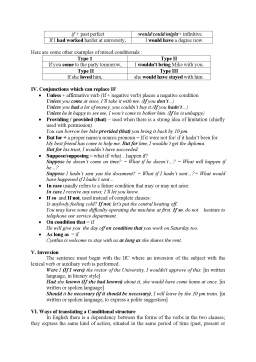Extras din curs
A. THEORETICAL CONSIDERATIONS
I. MODALS
There are nine central modals in English. (Other terms used for them are ‘modal verbs’ and ‘modal auxiliaries’ and ‘modal auxiliary verbs’.) They are used to add meaning to a main verb, for example to indicate how certain, possible, probable, necessary, obligatory something is, or how frequently something happens, or whether a course of action is recommended or allowed.
Can/ could; may/might;must; shall/should; will/would
Note: Need to, dare to, ought to are marginal modals. However, one semimodal which is frequently used is have (got)to.
CAN
FORM
a. Affirmative: can
b. Negative: cannot, can’t (used only in spoken and informal written English)
c. Interrogative: can + subject + infinitive
USES
a. Can expresses permission
Can he stay a little longer?
They can’t have lunch at 12.
b. Can expresses ability (can=be able to)
• physical power/capacity: Can you lift this piece of furniture?
• knowledge/skill: Can they solve this problem?
• circumstances: Can Susan come to our meeting on Wednesday? ( it may be paraphrased by be in position to: Is Susan free to do so? Is Susan in a position to do so?
c. Can expresses negative deduction:
Jane can’t be working so long.
Jane can’t have much experience in teaching.
Jane can’t have taken your money.
(in my opinion it’s impossible)
d. In questions, in conversation, can is used:
• to make suggestions
• to offer to do something or to make polite requests by either asking people to do things or asking for things.
What can I do around here?
Hello Paul. What can we do for you?
COULD
FORM
a. Affirmative: could
b. Negative: could not; couldn’t (used only in spoken and informal written English)
c. Interrogative: could + subject + infinitive
USES
a. Could expresses ability (be able to)
Tom could run ten miles when he was young. (=was able to)
b. Could expresses condition:
I could buy you a book. (if I want)
Couldn’t he fiind a better job? (if he wanted)
c. Could have done expresses:
i. an action which is not performed:
He could have helped you (but he didn’t)
ii. an action which in our opinion has not taken place
She couldn’t have overslept (it my opinion it isn’t possible)
They couldn’t have waited for two hours. (It’s out of the question)
The patterns could + bare infinitive and could + have + past participle are used to talk about possibility in the past.
I remember how it could snow in the mountains even in summer.
‘I can’t find my keys anywhere.’ ‘You could have left them in your office.’
d. In conversation, could is used to mark a present or future possibility. .
‘Where’s Peter?’ ‘He could be in the study.’ (=Perhaps he is in the study)
Note: with could in this use the degree of possibility is less sure than with ‘may’ or ‘might’.
e. Couldn’t as an extinction of can be used in not-so-polite requests.
Couldn’t you (wouldn’t it be possible for you to) give me your phone number?
Could not and couldn’t are used with comparatives to emphasize that someone or something has as much as is possible of a particular quality (possibility or impossibility).
Mary couldn’t be happier. (=Mary is very happy indeed)
The news couldn’t have come at a better time.
MAY
FORM
a. Affirmative: may
b. Negative: may not
c. Interrogative: may + subject + infinitive
USES
a. May expresses (a) asking for permission as well as in (b) granting permission.
Excuse me. May I have a look at your newspaper?
‘Could I make a suggestion?’ ‘Of course, you may.’
May also indicates that someone is allowed to do something or has the choice of doing something, usually because of a rule or law. May not indicates that someone is not allowed to do something (=prohibition). This second use is chiefly limited to quick responses to ‘may’.
Any two persons may marry in Scotland provided that both persons are at least 16 years of age on the day of their marriage.
‘’May I join your trip?’ ‘No, you may not!’
b. May expresses possibility in the present and in the future:
Don’t phone at 9.30. I may be watching the documentary film on television.
‘There’s someone at the door.’ ‘It may be Peter.’ (=Perhaps it is Peter)
I haven’t decided yet where to spend my holidays. I may go to Greece. (Perhaps I will go to Greece)
c. May/might+have+Past Participle expresses posibility about a past action:
The events may or may not have been connected. (it’s possible that they were connected)
The chaos may have contributed to the deaths of up to 20 people. (it’s possible that it has contributed)
d. For offers and polite requests:
May we recommended a weekend on the Black Sea Coast?
Do sit down. And may we offer you something to drink?
May I come with you to the conference?
e. In formal spoken English, may is also used as a polite way of interrupting someone, asking a question or introducing what the speaker is going to say next.
‘If I may interrupt for a moment,’ John said.
Anyway, may I just ask you one other thing?
f. May is used when the speaker is mentioning the reaction or attitude that he/she thinks someone is likely to have to something he/she is about to say.
You know, Brian, whatever you may think, I work hard for a living.
Preview document
Conținut arhivă zip
- Modals and Semi-modals.doc








































